Entrepreneurship Report: Venture Types, SME Impact, and Personality
VerifiedAdded on 2020/06/04
|14
|4730
|66
Report
AI Summary
This report delves into the multifaceted world of entrepreneurship, examining various types of entrepreneurial ventures, including small business ventures, social ventures, serial entrepreneurs, female entrepreneurs, and innovative ventures. It contrasts the similarities and differences between these ventures, highlighting their varying scopes and operational characteristics. The report further analyzes the role and impact of small and medium enterprises (SMEs) on the economy, particularly in the context of the UK, and discusses the effects of Brexit on the economic landscape. Additionally, it explores the differentiation between managers and entrepreneurs, using Mark Zuckerberg and Walt Disney as examples to illustrate key personality traits and the influence of background and experience in fostering entrepreneurial success. The report also touches upon the aspects of an entrepreneurial personality and how it contributes to the success of a business.

ENTREPRENEURSHIP
Paraphrase This Document
Need a fresh take? Get an instant paraphrase of this document with our AI Paraphraser
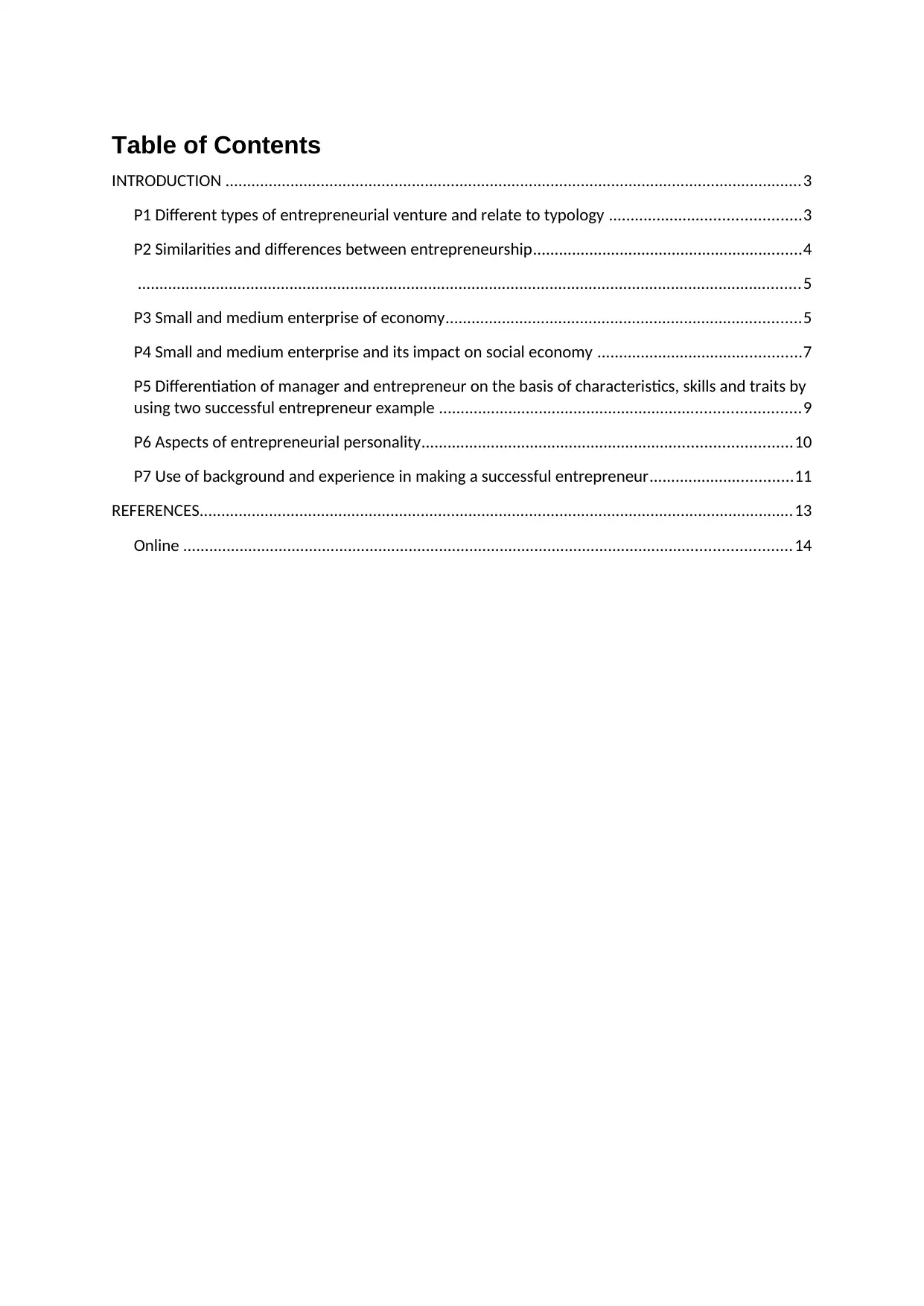
Table of Contents
INTRODUCTION .....................................................................................................................................3
P1 Different types of entrepreneurial venture and relate to typology ............................................3
P2 Similarities and differences between entrepreneurship..............................................................4
.........................................................................................................................................................5
P3 Small and medium enterprise of economy..................................................................................5
P4 Small and medium enterprise and its impact on social economy ...............................................7
P5 Differentiation of manager and entrepreneur on the basis of characteristics, skills and traits by
using two successful entrepreneur example ...................................................................................9
P6 Aspects of entrepreneurial personality.....................................................................................10
P7 Use of background and experience in making a successful entrepreneur.................................11
REFERENCES.........................................................................................................................................13
Online ............................................................................................................................................14
INTRODUCTION .....................................................................................................................................3
P1 Different types of entrepreneurial venture and relate to typology ............................................3
P2 Similarities and differences between entrepreneurship..............................................................4
.........................................................................................................................................................5
P3 Small and medium enterprise of economy..................................................................................5
P4 Small and medium enterprise and its impact on social economy ...............................................7
P5 Differentiation of manager and entrepreneur on the basis of characteristics, skills and traits by
using two successful entrepreneur example ...................................................................................9
P6 Aspects of entrepreneurial personality.....................................................................................10
P7 Use of background and experience in making a successful entrepreneur.................................11
REFERENCES.........................................................................................................................................13
Online ............................................................................................................................................14
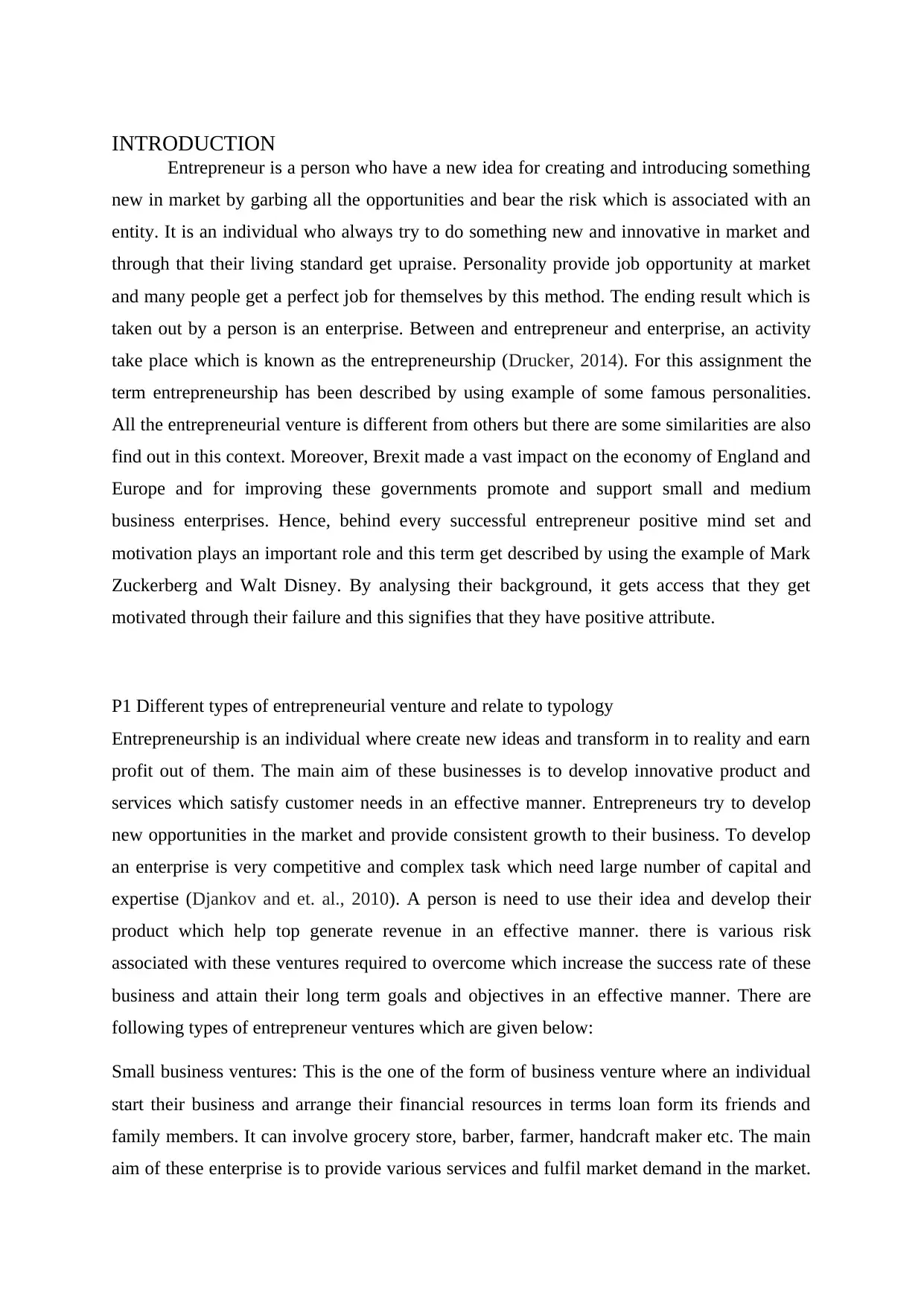
INTRODUCTION
Entrepreneur is a person who have a new idea for creating and introducing something
new in market by garbing all the opportunities and bear the risk which is associated with an
entity. It is an individual who always try to do something new and innovative in market and
through that their living standard get upraise. Personality provide job opportunity at market
and many people get a perfect job for themselves by this method. The ending result which is
taken out by a person is an enterprise. Between and entrepreneur and enterprise, an activity
take place which is known as the entrepreneurship (Drucker, 2014). For this assignment the
term entrepreneurship has been described by using example of some famous personalities.
All the entrepreneurial venture is different from others but there are some similarities are also
find out in this context. Moreover, Brexit made a vast impact on the economy of England and
Europe and for improving these governments promote and support small and medium
business enterprises. Hence, behind every successful entrepreneur positive mind set and
motivation plays an important role and this term get described by using the example of Mark
Zuckerberg and Walt Disney. By analysing their background, it gets access that they get
motivated through their failure and this signifies that they have positive attribute.
P1 Different types of entrepreneurial venture and relate to typology
Entrepreneurship is an individual where create new ideas and transform in to reality and earn
profit out of them. The main aim of these businesses is to develop innovative product and
services which satisfy customer needs in an effective manner. Entrepreneurs try to develop
new opportunities in the market and provide consistent growth to their business. To develop
an enterprise is very competitive and complex task which need large number of capital and
expertise (Djankov and et. al., 2010). A person is need to use their idea and develop their
product which help top generate revenue in an effective manner. there is various risk
associated with these ventures required to overcome which increase the success rate of these
business and attain their long term goals and objectives in an effective manner. There are
following types of entrepreneur ventures which are given below:
Small business ventures: This is the one of the form of business venture where an individual
start their business and arrange their financial resources in terms loan form its friends and
family members. It can involve grocery store, barber, farmer, handcraft maker etc. The main
aim of these enterprise is to provide various services and fulfil market demand in the market.
Entrepreneur is a person who have a new idea for creating and introducing something
new in market by garbing all the opportunities and bear the risk which is associated with an
entity. It is an individual who always try to do something new and innovative in market and
through that their living standard get upraise. Personality provide job opportunity at market
and many people get a perfect job for themselves by this method. The ending result which is
taken out by a person is an enterprise. Between and entrepreneur and enterprise, an activity
take place which is known as the entrepreneurship (Drucker, 2014). For this assignment the
term entrepreneurship has been described by using example of some famous personalities.
All the entrepreneurial venture is different from others but there are some similarities are also
find out in this context. Moreover, Brexit made a vast impact on the economy of England and
Europe and for improving these governments promote and support small and medium
business enterprises. Hence, behind every successful entrepreneur positive mind set and
motivation plays an important role and this term get described by using the example of Mark
Zuckerberg and Walt Disney. By analysing their background, it gets access that they get
motivated through their failure and this signifies that they have positive attribute.
P1 Different types of entrepreneurial venture and relate to typology
Entrepreneurship is an individual where create new ideas and transform in to reality and earn
profit out of them. The main aim of these businesses is to develop innovative product and
services which satisfy customer needs in an effective manner. Entrepreneurs try to develop
new opportunities in the market and provide consistent growth to their business. To develop
an enterprise is very competitive and complex task which need large number of capital and
expertise (Djankov and et. al., 2010). A person is need to use their idea and develop their
product which help top generate revenue in an effective manner. there is various risk
associated with these ventures required to overcome which increase the success rate of these
business and attain their long term goals and objectives in an effective manner. There are
following types of entrepreneur ventures which are given below:
Small business ventures: This is the one of the form of business venture where an individual
start their business and arrange their financial resources in terms loan form its friends and
family members. It can involve grocery store, barber, farmer, handcraft maker etc. The main
aim of these enterprise is to provide various services and fulfil market demand in the market.
⊘ This is a preview!⊘
Do you want full access?
Subscribe today to unlock all pages.

Trusted by 1+ million students worldwide
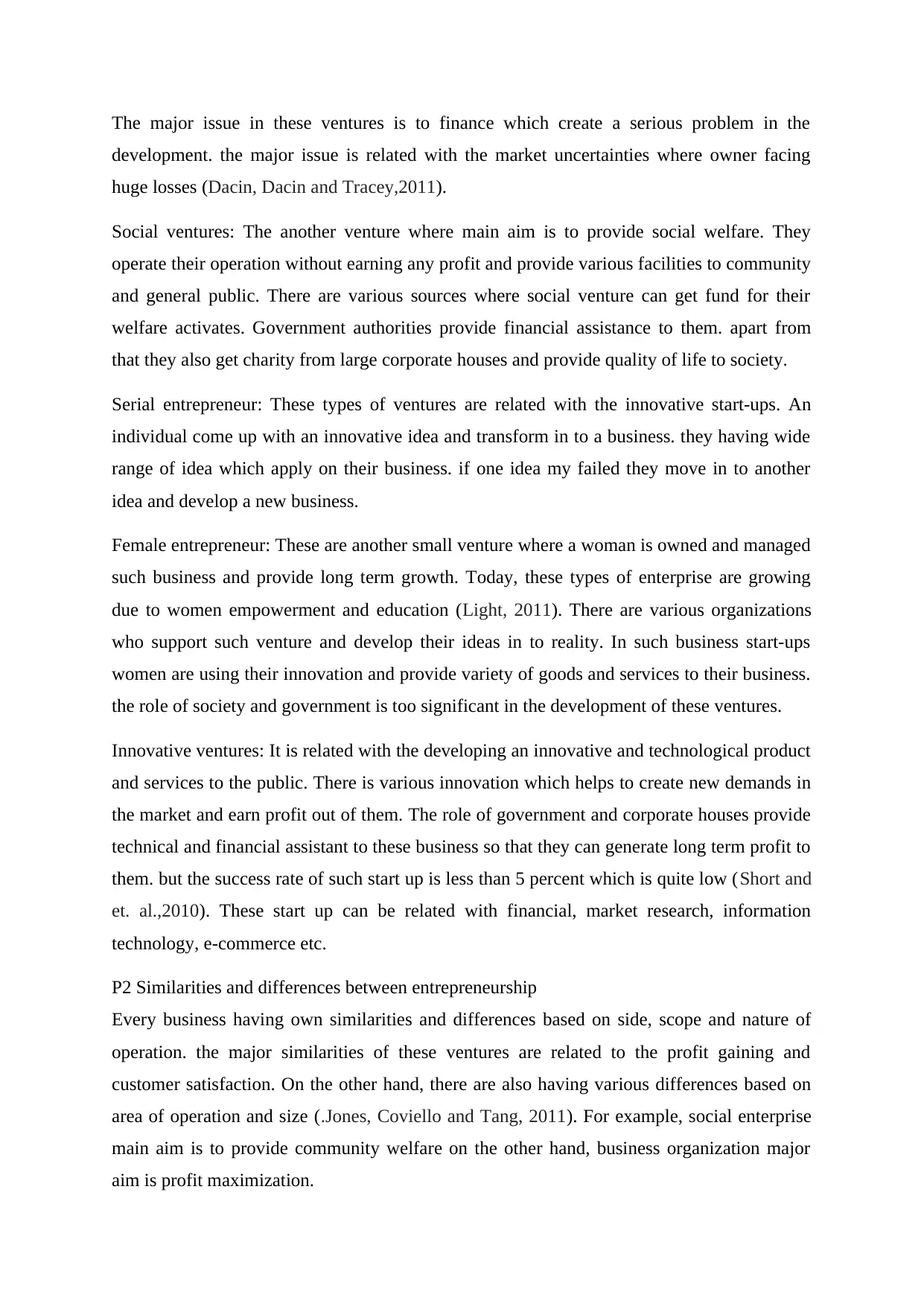
The major issue in these ventures is to finance which create a serious problem in the
development. the major issue is related with the market uncertainties where owner facing
huge losses (Dacin, Dacin and Tracey,2011).
Social ventures: The another venture where main aim is to provide social welfare. They
operate their operation without earning any profit and provide various facilities to community
and general public. There are various sources where social venture can get fund for their
welfare activates. Government authorities provide financial assistance to them. apart from
that they also get charity from large corporate houses and provide quality of life to society.
Serial entrepreneur: These types of ventures are related with the innovative start-ups. An
individual come up with an innovative idea and transform in to a business. they having wide
range of idea which apply on their business. if one idea my failed they move in to another
idea and develop a new business.
Female entrepreneur: These are another small venture where a woman is owned and managed
such business and provide long term growth. Today, these types of enterprise are growing
due to women empowerment and education (Light, 2011). There are various organizations
who support such venture and develop their ideas in to reality. In such business start-ups
women are using their innovation and provide variety of goods and services to their business.
the role of society and government is too significant in the development of these ventures.
Innovative ventures: It is related with the developing an innovative and technological product
and services to the public. There is various innovation which helps to create new demands in
the market and earn profit out of them. The role of government and corporate houses provide
technical and financial assistant to these business so that they can generate long term profit to
them. but the success rate of such start up is less than 5 percent which is quite low (Short and
et. al.,2010). These start up can be related with financial, market research, information
technology, e-commerce etc.
P2 Similarities and differences between entrepreneurship
Every business having own similarities and differences based on side, scope and nature of
operation. the major similarities of these ventures are related to the profit gaining and
customer satisfaction. On the other hand, there are also having various differences based on
area of operation and size (.Jones, Coviello and Tang, 2011). For example, social enterprise
main aim is to provide community welfare on the other hand, business organization major
aim is profit maximization.
development. the major issue is related with the market uncertainties where owner facing
huge losses (Dacin, Dacin and Tracey,2011).
Social ventures: The another venture where main aim is to provide social welfare. They
operate their operation without earning any profit and provide various facilities to community
and general public. There are various sources where social venture can get fund for their
welfare activates. Government authorities provide financial assistance to them. apart from
that they also get charity from large corporate houses and provide quality of life to society.
Serial entrepreneur: These types of ventures are related with the innovative start-ups. An
individual come up with an innovative idea and transform in to a business. they having wide
range of idea which apply on their business. if one idea my failed they move in to another
idea and develop a new business.
Female entrepreneur: These are another small venture where a woman is owned and managed
such business and provide long term growth. Today, these types of enterprise are growing
due to women empowerment and education (Light, 2011). There are various organizations
who support such venture and develop their ideas in to reality. In such business start-ups
women are using their innovation and provide variety of goods and services to their business.
the role of society and government is too significant in the development of these ventures.
Innovative ventures: It is related with the developing an innovative and technological product
and services to the public. There is various innovation which helps to create new demands in
the market and earn profit out of them. The role of government and corporate houses provide
technical and financial assistant to these business so that they can generate long term profit to
them. but the success rate of such start up is less than 5 percent which is quite low (Short and
et. al.,2010). These start up can be related with financial, market research, information
technology, e-commerce etc.
P2 Similarities and differences between entrepreneurship
Every business having own similarities and differences based on side, scope and nature of
operation. the major similarities of these ventures are related to the profit gaining and
customer satisfaction. On the other hand, there are also having various differences based on
area of operation and size (.Jones, Coviello and Tang, 2011). For example, social enterprise
main aim is to provide community welfare on the other hand, business organization major
aim is profit maximization.
Paraphrase This Document
Need a fresh take? Get an instant paraphrase of this document with our AI Paraphraser
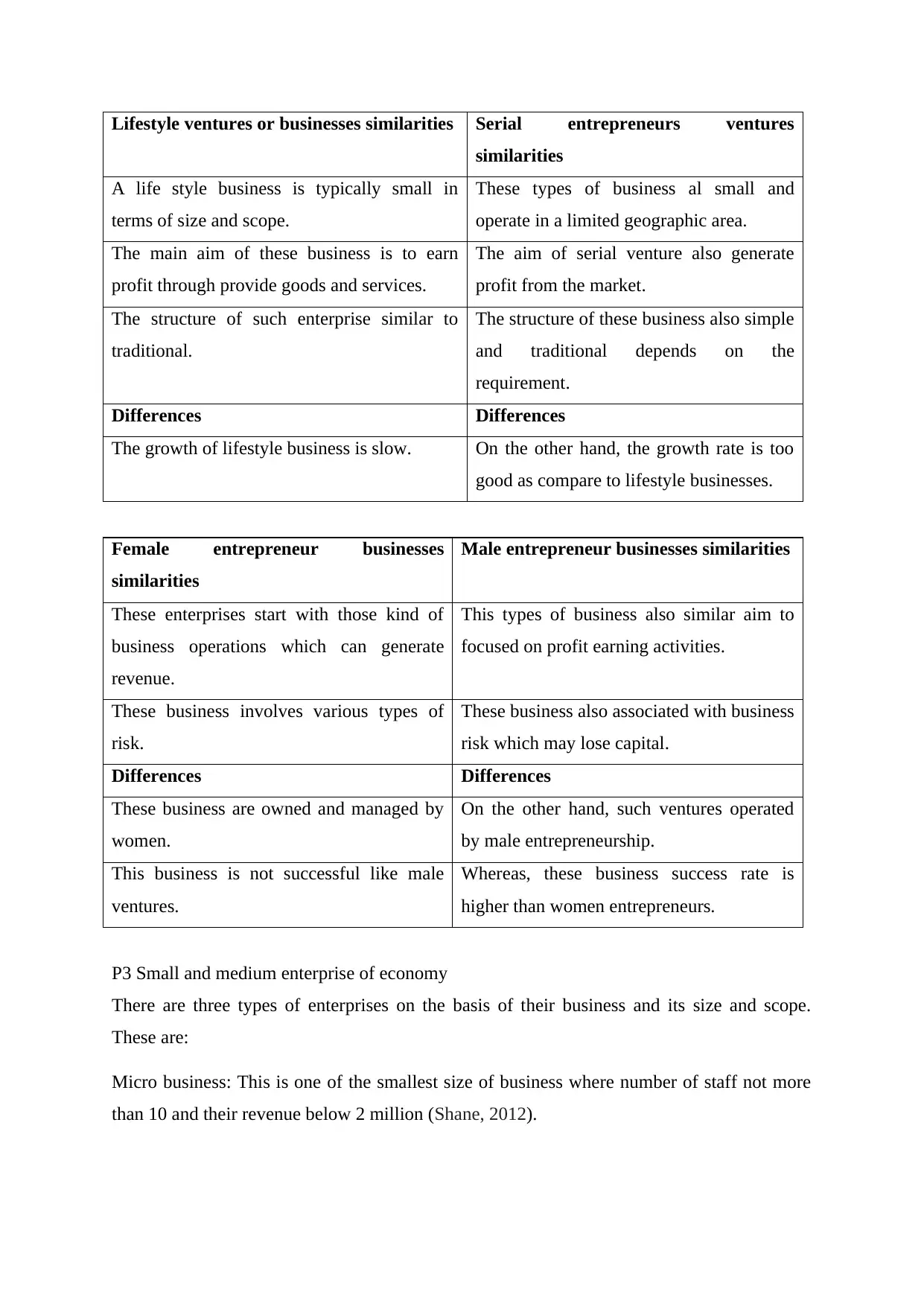
Lifestyle ventures or businesses similarities Serial entrepreneurs ventures
similarities
A life style business is typically small in
terms of size and scope.
These types of business al small and
operate in a limited geographic area.
The main aim of these business is to earn
profit through provide goods and services.
The aim of serial venture also generate
profit from the market.
The structure of such enterprise similar to
traditional.
The structure of these business also simple
and traditional depends on the
requirement.
Differences Differences
The growth of lifestyle business is slow. On the other hand, the growth rate is too
good as compare to lifestyle businesses.
Female entrepreneur businesses
similarities
Male entrepreneur businesses similarities
These enterprises start with those kind of
business operations which can generate
revenue.
This types of business also similar aim to
focused on profit earning activities.
These business involves various types of
risk.
These business also associated with business
risk which may lose capital.
Differences Differences
These business are owned and managed by
women.
On the other hand, such ventures operated
by male entrepreneurship.
This business is not successful like male
ventures.
Whereas, these business success rate is
higher than women entrepreneurs.
P3 Small and medium enterprise of economy
There are three types of enterprises on the basis of their business and its size and scope.
These are:
Micro business: This is one of the smallest size of business where number of staff not more
than 10 and their revenue below 2 million (Shane, 2012).
similarities
A life style business is typically small in
terms of size and scope.
These types of business al small and
operate in a limited geographic area.
The main aim of these business is to earn
profit through provide goods and services.
The aim of serial venture also generate
profit from the market.
The structure of such enterprise similar to
traditional.
The structure of these business also simple
and traditional depends on the
requirement.
Differences Differences
The growth of lifestyle business is slow. On the other hand, the growth rate is too
good as compare to lifestyle businesses.
Female entrepreneur businesses
similarities
Male entrepreneur businesses similarities
These enterprises start with those kind of
business operations which can generate
revenue.
This types of business also similar aim to
focused on profit earning activities.
These business involves various types of
risk.
These business also associated with business
risk which may lose capital.
Differences Differences
These business are owned and managed by
women.
On the other hand, such ventures operated
by male entrepreneurship.
This business is not successful like male
ventures.
Whereas, these business success rate is
higher than women entrepreneurs.
P3 Small and medium enterprise of economy
There are three types of enterprises on the basis of their business and its size and scope.
These are:
Micro business: This is one of the smallest size of business where number of staff not more
than 10 and their revenue below 2 million (Shane, 2012).
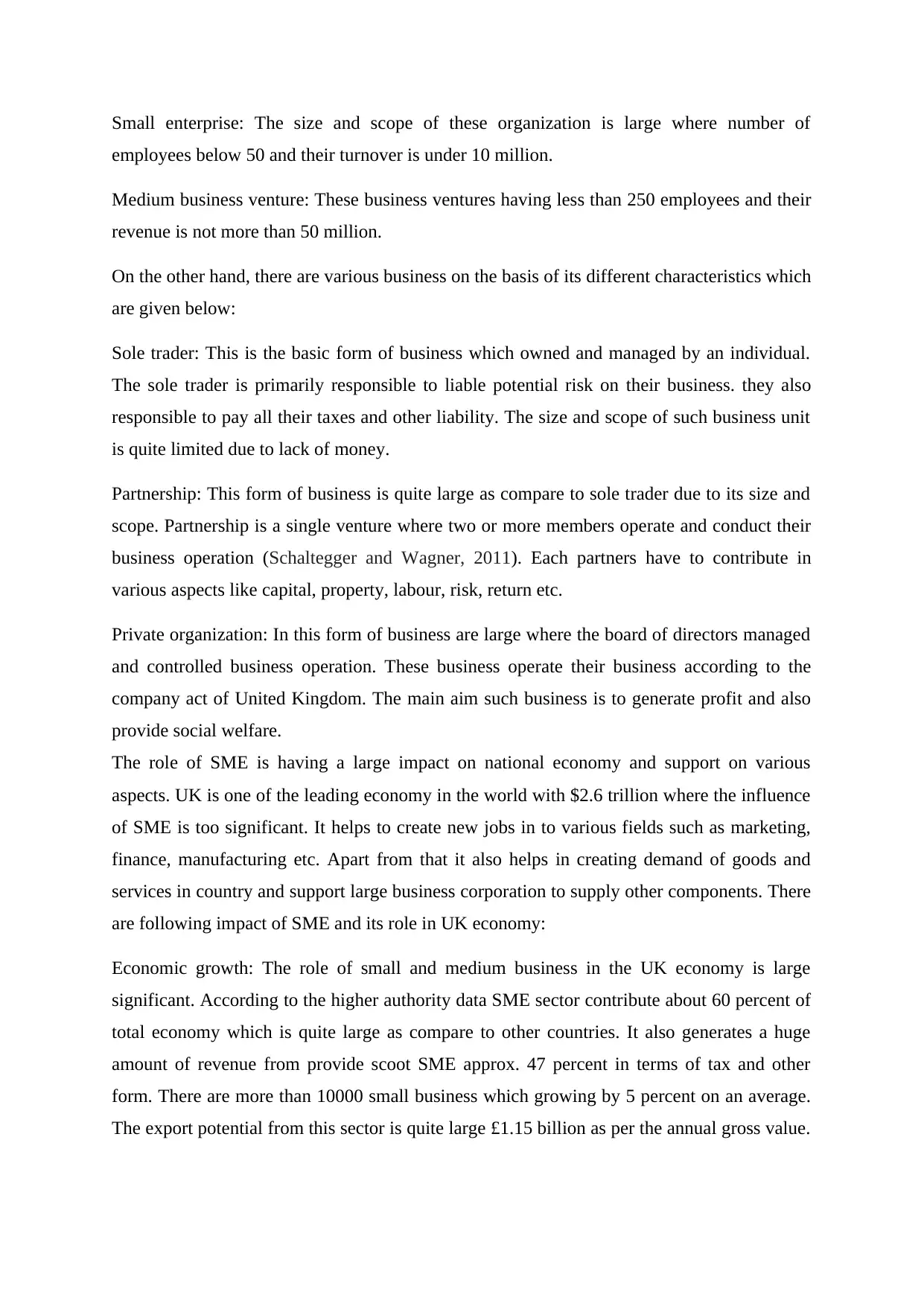
Small enterprise: The size and scope of these organization is large where number of
employees below 50 and their turnover is under 10 million.
Medium business venture: These business ventures having less than 250 employees and their
revenue is not more than 50 million.
On the other hand, there are various business on the basis of its different characteristics which
are given below:
Sole trader: This is the basic form of business which owned and managed by an individual.
The sole trader is primarily responsible to liable potential risk on their business. they also
responsible to pay all their taxes and other liability. The size and scope of such business unit
is quite limited due to lack of money.
Partnership: This form of business is quite large as compare to sole trader due to its size and
scope. Partnership is a single venture where two or more members operate and conduct their
business operation (Schaltegger and Wagner, 2011). Each partners have to contribute in
various aspects like capital, property, labour, risk, return etc.
Private organization: In this form of business are large where the board of directors managed
and controlled business operation. These business operate their business according to the
company act of United Kingdom. The main aim such business is to generate profit and also
provide social welfare.
The role of SME is having a large impact on national economy and support on various
aspects. UK is one of the leading economy in the world with $2.6 trillion where the influence
of SME is too significant. It helps to create new jobs in to various fields such as marketing,
finance, manufacturing etc. Apart from that it also helps in creating demand of goods and
services in country and support large business corporation to supply other components. There
are following impact of SME and its role in UK economy:
Economic growth: The role of small and medium business in the UK economy is large
significant. According to the higher authority data SME sector contribute about 60 percent of
total economy which is quite large as compare to other countries. It also generates a huge
amount of revenue from provide scoot SME approx. 47 percent in terms of tax and other
form. There are more than 10000 small business which growing by 5 percent on an average.
The export potential from this sector is quite large £1.15 billion as per the annual gross value.
employees below 50 and their turnover is under 10 million.
Medium business venture: These business ventures having less than 250 employees and their
revenue is not more than 50 million.
On the other hand, there are various business on the basis of its different characteristics which
are given below:
Sole trader: This is the basic form of business which owned and managed by an individual.
The sole trader is primarily responsible to liable potential risk on their business. they also
responsible to pay all their taxes and other liability. The size and scope of such business unit
is quite limited due to lack of money.
Partnership: This form of business is quite large as compare to sole trader due to its size and
scope. Partnership is a single venture where two or more members operate and conduct their
business operation (Schaltegger and Wagner, 2011). Each partners have to contribute in
various aspects like capital, property, labour, risk, return etc.
Private organization: In this form of business are large where the board of directors managed
and controlled business operation. These business operate their business according to the
company act of United Kingdom. The main aim such business is to generate profit and also
provide social welfare.
The role of SME is having a large impact on national economy and support on various
aspects. UK is one of the leading economy in the world with $2.6 trillion where the influence
of SME is too significant. It helps to create new jobs in to various fields such as marketing,
finance, manufacturing etc. Apart from that it also helps in creating demand of goods and
services in country and support large business corporation to supply other components. There
are following impact of SME and its role in UK economy:
Economic growth: The role of small and medium business in the UK economy is large
significant. According to the higher authority data SME sector contribute about 60 percent of
total economy which is quite large as compare to other countries. It also generates a huge
amount of revenue from provide scoot SME approx. 47 percent in terms of tax and other
form. There are more than 10000 small business which growing by 5 percent on an average.
The export potential from this sector is quite large £1.15 billion as per the annual gross value.
⊘ This is a preview!⊘
Do you want full access?
Subscribe today to unlock all pages.

Trusted by 1+ million students worldwide
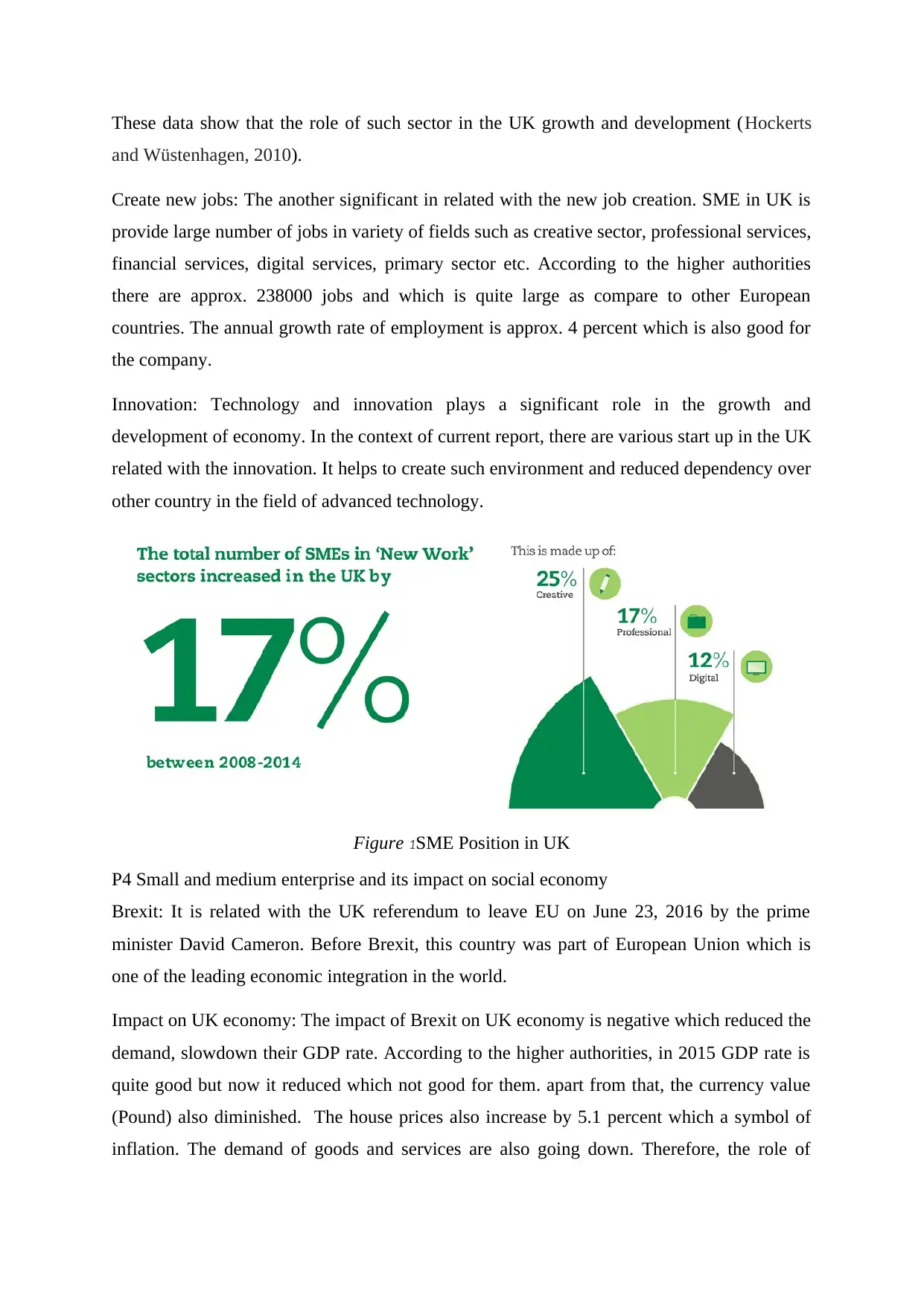
These data show that the role of such sector in the UK growth and development (Hockerts
and Wüstenhagen, 2010).
Create new jobs: The another significant in related with the new job creation. SME in UK is
provide large number of jobs in variety of fields such as creative sector, professional services,
financial services, digital services, primary sector etc. According to the higher authorities
there are approx. 238000 jobs and which is quite large as compare to other European
countries. The annual growth rate of employment is approx. 4 percent which is also good for
the company.
Innovation: Technology and innovation plays a significant role in the growth and
development of economy. In the context of current report, there are various start up in the UK
related with the innovation. It helps to create such environment and reduced dependency over
other country in the field of advanced technology.
Figure 1SME Position in UK
P4 Small and medium enterprise and its impact on social economy
Brexit: It is related with the UK referendum to leave EU on June 23, 2016 by the prime
minister David Cameron. Before Brexit, this country was part of European Union which is
one of the leading economic integration in the world.
Impact on UK economy: The impact of Brexit on UK economy is negative which reduced the
demand, slowdown their GDP rate. According to the higher authorities, in 2015 GDP rate is
quite good but now it reduced which not good for them. apart from that, the currency value
(Pound) also diminished. The house prices also increase by 5.1 percent which a symbol of
inflation. The demand of goods and services are also going down. Therefore, the role of
and Wüstenhagen, 2010).
Create new jobs: The another significant in related with the new job creation. SME in UK is
provide large number of jobs in variety of fields such as creative sector, professional services,
financial services, digital services, primary sector etc. According to the higher authorities
there are approx. 238000 jobs and which is quite large as compare to other European
countries. The annual growth rate of employment is approx. 4 percent which is also good for
the company.
Innovation: Technology and innovation plays a significant role in the growth and
development of economy. In the context of current report, there are various start up in the UK
related with the innovation. It helps to create such environment and reduced dependency over
other country in the field of advanced technology.
Figure 1SME Position in UK
P4 Small and medium enterprise and its impact on social economy
Brexit: It is related with the UK referendum to leave EU on June 23, 2016 by the prime
minister David Cameron. Before Brexit, this country was part of European Union which is
one of the leading economic integration in the world.
Impact on UK economy: The impact of Brexit on UK economy is negative which reduced the
demand, slowdown their GDP rate. According to the higher authorities, in 2015 GDP rate is
quite good but now it reduced which not good for them. apart from that, the currency value
(Pound) also diminished. The house prices also increase by 5.1 percent which a symbol of
inflation. The demand of goods and services are also going down. Therefore, the role of
Paraphrase This Document
Need a fresh take? Get an instant paraphrase of this document with our AI Paraphraser
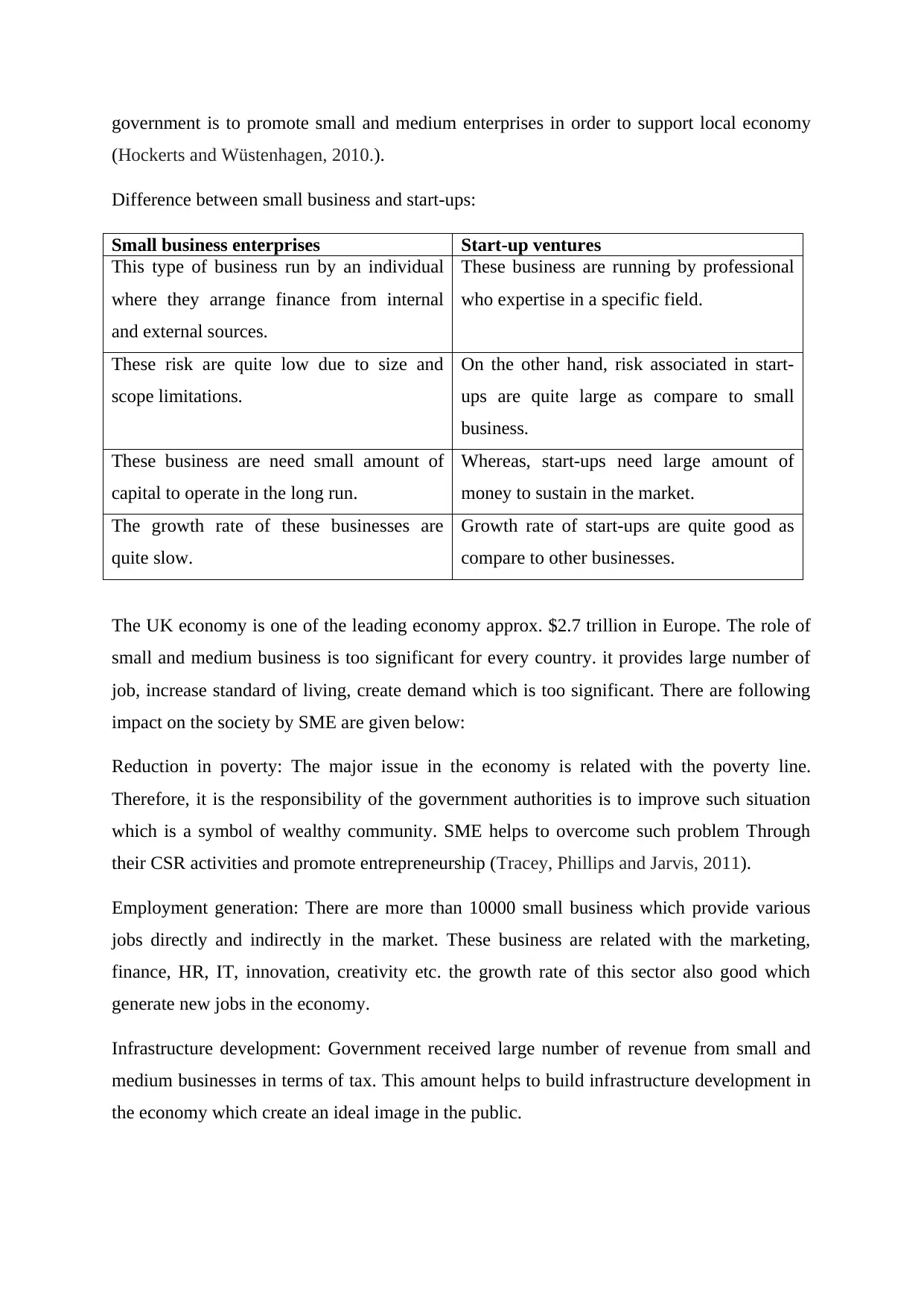
government is to promote small and medium enterprises in order to support local economy
(Hockerts and Wüstenhagen, 2010.).
Difference between small business and start-ups:
Small business enterprises Start-up ventures
This type of business run by an individual
where they arrange finance from internal
and external sources.
These business are running by professional
who expertise in a specific field.
These risk are quite low due to size and
scope limitations.
On the other hand, risk associated in start-
ups are quite large as compare to small
business.
These business are need small amount of
capital to operate in the long run.
Whereas, start-ups need large amount of
money to sustain in the market.
The growth rate of these businesses are
quite slow.
Growth rate of start-ups are quite good as
compare to other businesses.
The UK economy is one of the leading economy approx. $2.7 trillion in Europe. The role of
small and medium business is too significant for every country. it provides large number of
job, increase standard of living, create demand which is too significant. There are following
impact on the society by SME are given below:
Reduction in poverty: The major issue in the economy is related with the poverty line.
Therefore, it is the responsibility of the government authorities is to improve such situation
which is a symbol of wealthy community. SME helps to overcome such problem Through
their CSR activities and promote entrepreneurship (Tracey, Phillips and Jarvis, 2011).
Employment generation: There are more than 10000 small business which provide various
jobs directly and indirectly in the market. These business are related with the marketing,
finance, HR, IT, innovation, creativity etc. the growth rate of this sector also good which
generate new jobs in the economy.
Infrastructure development: Government received large number of revenue from small and
medium businesses in terms of tax. This amount helps to build infrastructure development in
the economy which create an ideal image in the public.
(Hockerts and Wüstenhagen, 2010.).
Difference between small business and start-ups:
Small business enterprises Start-up ventures
This type of business run by an individual
where they arrange finance from internal
and external sources.
These business are running by professional
who expertise in a specific field.
These risk are quite low due to size and
scope limitations.
On the other hand, risk associated in start-
ups are quite large as compare to small
business.
These business are need small amount of
capital to operate in the long run.
Whereas, start-ups need large amount of
money to sustain in the market.
The growth rate of these businesses are
quite slow.
Growth rate of start-ups are quite good as
compare to other businesses.
The UK economy is one of the leading economy approx. $2.7 trillion in Europe. The role of
small and medium business is too significant for every country. it provides large number of
job, increase standard of living, create demand which is too significant. There are following
impact on the society by SME are given below:
Reduction in poverty: The major issue in the economy is related with the poverty line.
Therefore, it is the responsibility of the government authorities is to improve such situation
which is a symbol of wealthy community. SME helps to overcome such problem Through
their CSR activities and promote entrepreneurship (Tracey, Phillips and Jarvis, 2011).
Employment generation: There are more than 10000 small business which provide various
jobs directly and indirectly in the market. These business are related with the marketing,
finance, HR, IT, innovation, creativity etc. the growth rate of this sector also good which
generate new jobs in the economy.
Infrastructure development: Government received large number of revenue from small and
medium businesses in terms of tax. This amount helps to build infrastructure development in
the economy which create an ideal image in the public.
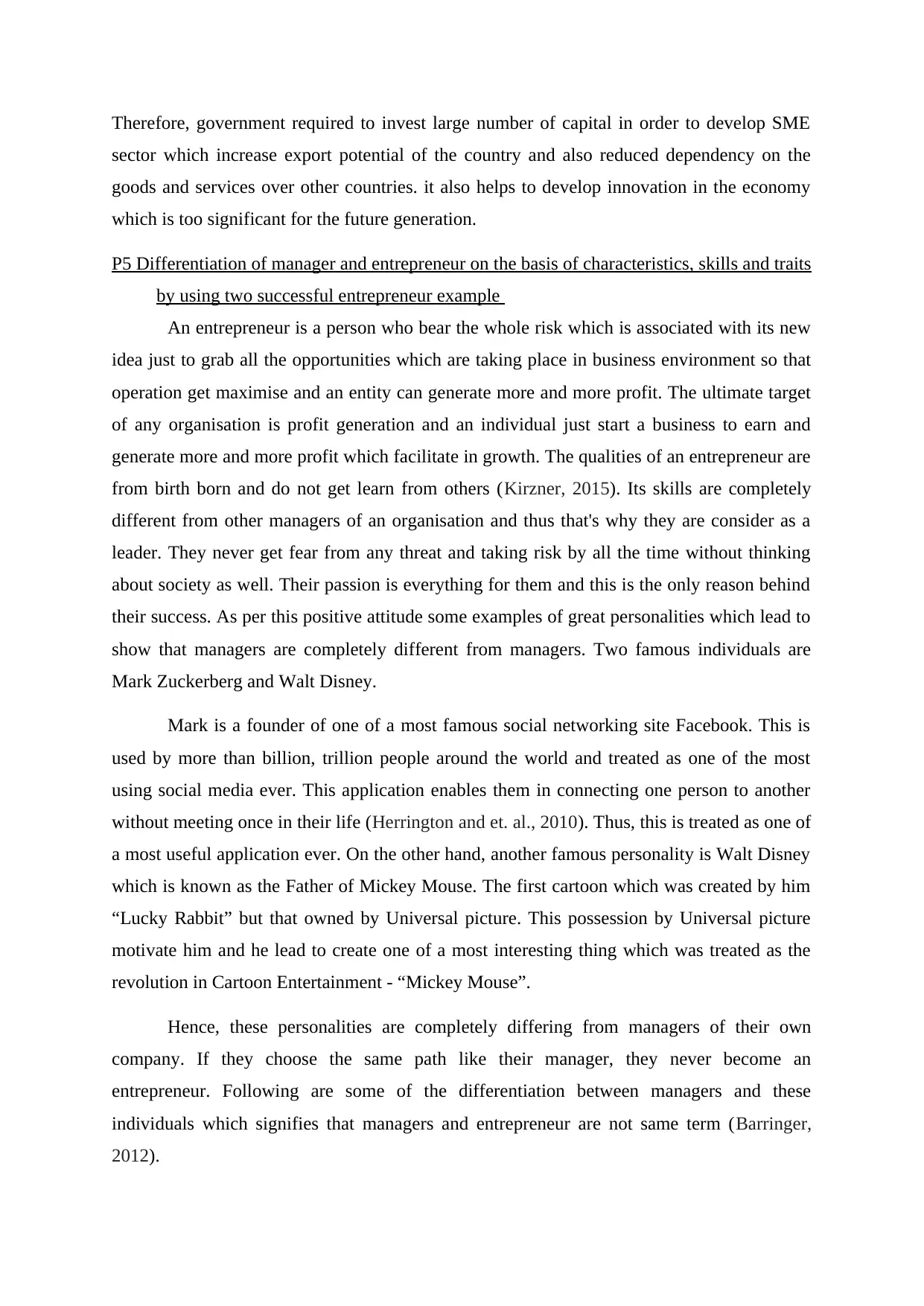
Therefore, government required to invest large number of capital in order to develop SME
sector which increase export potential of the country and also reduced dependency on the
goods and services over other countries. it also helps to develop innovation in the economy
which is too significant for the future generation.
P5 Differentiation of manager and entrepreneur on the basis of characteristics, skills and traits
by using two successful entrepreneur example
An entrepreneur is a person who bear the whole risk which is associated with its new
idea just to grab all the opportunities which are taking place in business environment so that
operation get maximise and an entity can generate more and more profit. The ultimate target
of any organisation is profit generation and an individual just start a business to earn and
generate more and more profit which facilitate in growth. The qualities of an entrepreneur are
from birth born and do not get learn from others (Kirzner, 2015). Its skills are completely
different from other managers of an organisation and thus that's why they are consider as a
leader. They never get fear from any threat and taking risk by all the time without thinking
about society as well. Their passion is everything for them and this is the only reason behind
their success. As per this positive attitude some examples of great personalities which lead to
show that managers are completely different from managers. Two famous individuals are
Mark Zuckerberg and Walt Disney.
Mark is a founder of one of a most famous social networking site Facebook. This is
used by more than billion, trillion people around the world and treated as one of the most
using social media ever. This application enables them in connecting one person to another
without meeting once in their life (Herrington and et. al., 2010). Thus, this is treated as one of
a most useful application ever. On the other hand, another famous personality is Walt Disney
which is known as the Father of Mickey Mouse. The first cartoon which was created by him
“Lucky Rabbit” but that owned by Universal picture. This possession by Universal picture
motivate him and he lead to create one of a most interesting thing which was treated as the
revolution in Cartoon Entertainment - “Mickey Mouse”.
Hence, these personalities are completely differing from managers of their own
company. If they choose the same path like their manager, they never become an
entrepreneur. Following are some of the differentiation between managers and these
individuals which signifies that managers and entrepreneur are not same term (Barringer,
2012).
sector which increase export potential of the country and also reduced dependency on the
goods and services over other countries. it also helps to develop innovation in the economy
which is too significant for the future generation.
P5 Differentiation of manager and entrepreneur on the basis of characteristics, skills and traits
by using two successful entrepreneur example
An entrepreneur is a person who bear the whole risk which is associated with its new
idea just to grab all the opportunities which are taking place in business environment so that
operation get maximise and an entity can generate more and more profit. The ultimate target
of any organisation is profit generation and an individual just start a business to earn and
generate more and more profit which facilitate in growth. The qualities of an entrepreneur are
from birth born and do not get learn from others (Kirzner, 2015). Its skills are completely
different from other managers of an organisation and thus that's why they are consider as a
leader. They never get fear from any threat and taking risk by all the time without thinking
about society as well. Their passion is everything for them and this is the only reason behind
their success. As per this positive attitude some examples of great personalities which lead to
show that managers are completely different from managers. Two famous individuals are
Mark Zuckerberg and Walt Disney.
Mark is a founder of one of a most famous social networking site Facebook. This is
used by more than billion, trillion people around the world and treated as one of the most
using social media ever. This application enables them in connecting one person to another
without meeting once in their life (Herrington and et. al., 2010). Thus, this is treated as one of
a most useful application ever. On the other hand, another famous personality is Walt Disney
which is known as the Father of Mickey Mouse. The first cartoon which was created by him
“Lucky Rabbit” but that owned by Universal picture. This possession by Universal picture
motivate him and he lead to create one of a most interesting thing which was treated as the
revolution in Cartoon Entertainment - “Mickey Mouse”.
Hence, these personalities are completely differing from managers of their own
company. If they choose the same path like their manager, they never become an
entrepreneur. Following are some of the differentiation between managers and these
individuals which signifies that managers and entrepreneur are not same term (Barringer,
2012).
⊘ This is a preview!⊘
Do you want full access?
Subscribe today to unlock all pages.

Trusted by 1+ million students worldwide
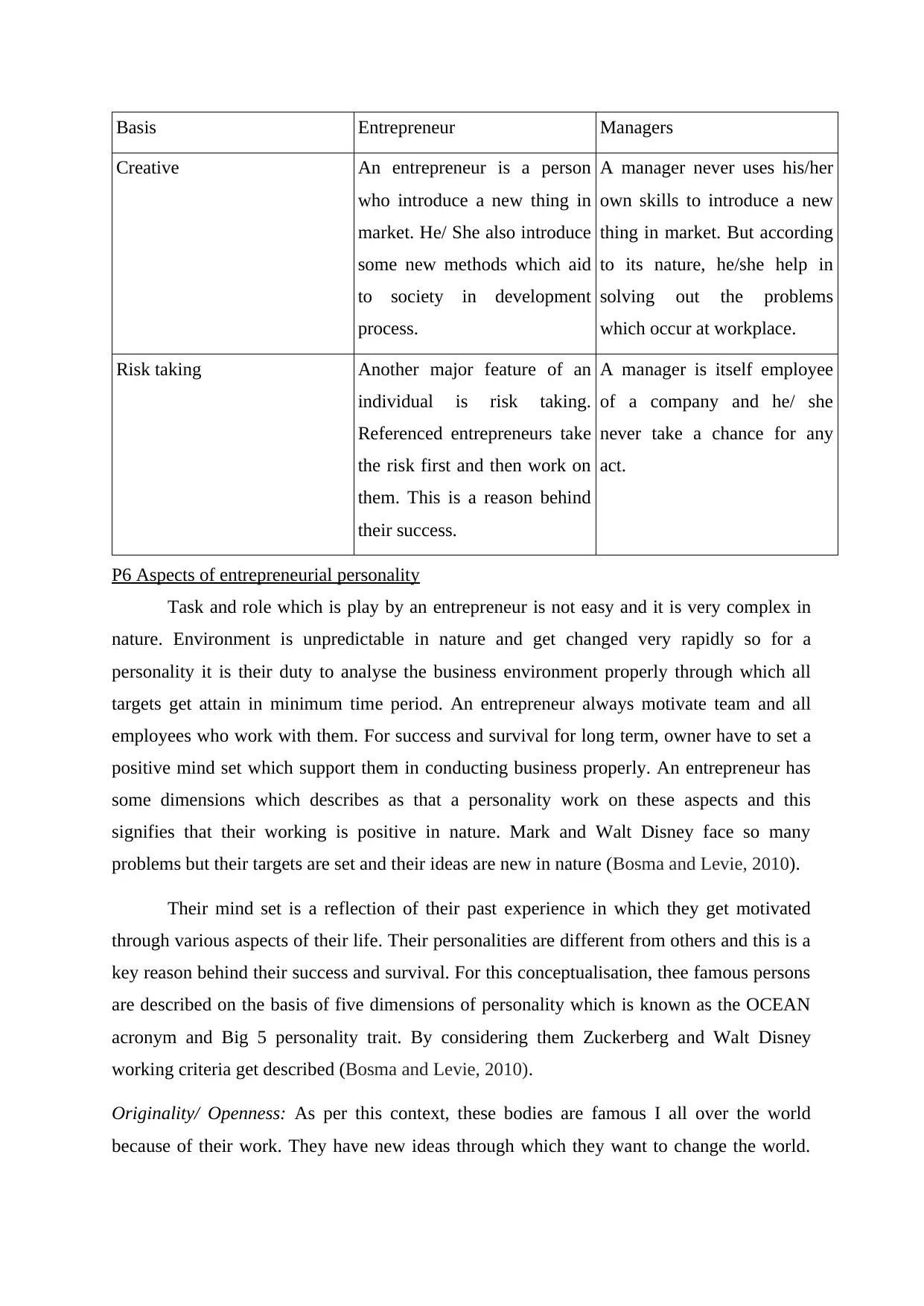
Basis Entrepreneur Managers
Creative An entrepreneur is a person
who introduce a new thing in
market. He/ She also introduce
some new methods which aid
to society in development
process.
A manager never uses his/her
own skills to introduce a new
thing in market. But according
to its nature, he/she help in
solving out the problems
which occur at workplace.
Risk taking Another major feature of an
individual is risk taking.
Referenced entrepreneurs take
the risk first and then work on
them. This is a reason behind
their success.
A manager is itself employee
of a company and he/ she
never take a chance for any
act.
P6 Aspects of entrepreneurial personality
Task and role which is play by an entrepreneur is not easy and it is very complex in
nature. Environment is unpredictable in nature and get changed very rapidly so for a
personality it is their duty to analyse the business environment properly through which all
targets get attain in minimum time period. An entrepreneur always motivate team and all
employees who work with them. For success and survival for long term, owner have to set a
positive mind set which support them in conducting business properly. An entrepreneur has
some dimensions which describes as that a personality work on these aspects and this
signifies that their working is positive in nature. Mark and Walt Disney face so many
problems but their targets are set and their ideas are new in nature (Bosma and Levie, 2010).
Their mind set is a reflection of their past experience in which they get motivated
through various aspects of their life. Their personalities are different from others and this is a
key reason behind their success and survival. For this conceptualisation, thee famous persons
are described on the basis of five dimensions of personality which is known as the OCEAN
acronym and Big 5 personality trait. By considering them Zuckerberg and Walt Disney
working criteria get described (Bosma and Levie, 2010).
Originality/ Openness: As per this context, these bodies are famous I all over the world
because of their work. They have new ideas through which they want to change the world.
Creative An entrepreneur is a person
who introduce a new thing in
market. He/ She also introduce
some new methods which aid
to society in development
process.
A manager never uses his/her
own skills to introduce a new
thing in market. But according
to its nature, he/she help in
solving out the problems
which occur at workplace.
Risk taking Another major feature of an
individual is risk taking.
Referenced entrepreneurs take
the risk first and then work on
them. This is a reason behind
their success.
A manager is itself employee
of a company and he/ she
never take a chance for any
act.
P6 Aspects of entrepreneurial personality
Task and role which is play by an entrepreneur is not easy and it is very complex in
nature. Environment is unpredictable in nature and get changed very rapidly so for a
personality it is their duty to analyse the business environment properly through which all
targets get attain in minimum time period. An entrepreneur always motivate team and all
employees who work with them. For success and survival for long term, owner have to set a
positive mind set which support them in conducting business properly. An entrepreneur has
some dimensions which describes as that a personality work on these aspects and this
signifies that their working is positive in nature. Mark and Walt Disney face so many
problems but their targets are set and their ideas are new in nature (Bosma and Levie, 2010).
Their mind set is a reflection of their past experience in which they get motivated
through various aspects of their life. Their personalities are different from others and this is a
key reason behind their success and survival. For this conceptualisation, thee famous persons
are described on the basis of five dimensions of personality which is known as the OCEAN
acronym and Big 5 personality trait. By considering them Zuckerberg and Walt Disney
working criteria get described (Bosma and Levie, 2010).
Originality/ Openness: As per this context, these bodies are famous I all over the world
because of their work. They have new ideas through which they want to change the world.
Paraphrase This Document
Need a fresh take? Get an instant paraphrase of this document with our AI Paraphraser
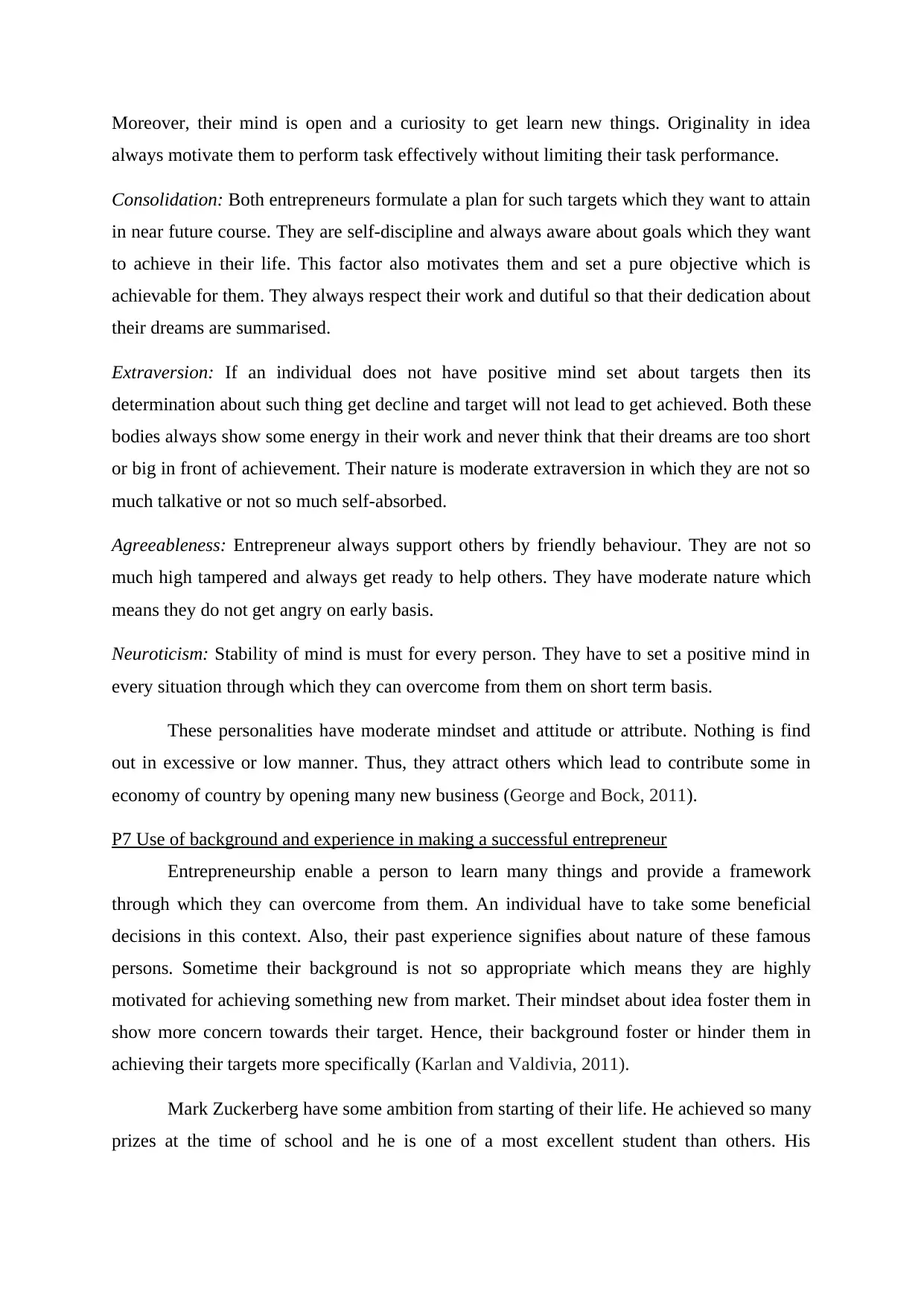
Moreover, their mind is open and a curiosity to get learn new things. Originality in idea
always motivate them to perform task effectively without limiting their task performance.
Consolidation: Both entrepreneurs formulate a plan for such targets which they want to attain
in near future course. They are self-discipline and always aware about goals which they want
to achieve in their life. This factor also motivates them and set a pure objective which is
achievable for them. They always respect their work and dutiful so that their dedication about
their dreams are summarised.
Extraversion: If an individual does not have positive mind set about targets then its
determination about such thing get decline and target will not lead to get achieved. Both these
bodies always show some energy in their work and never think that their dreams are too short
or big in front of achievement. Their nature is moderate extraversion in which they are not so
much talkative or not so much self-absorbed.
Agreeableness: Entrepreneur always support others by friendly behaviour. They are not so
much high tampered and always get ready to help others. They have moderate nature which
means they do not get angry on early basis.
Neuroticism: Stability of mind is must for every person. They have to set a positive mind in
every situation through which they can overcome from them on short term basis.
These personalities have moderate mindset and attitude or attribute. Nothing is find
out in excessive or low manner. Thus, they attract others which lead to contribute some in
economy of country by opening many new business (George and Bock, 2011).
P7 Use of background and experience in making a successful entrepreneur
Entrepreneurship enable a person to learn many things and provide a framework
through which they can overcome from them. An individual have to take some beneficial
decisions in this context. Also, their past experience signifies about nature of these famous
persons. Sometime their background is not so appropriate which means they are highly
motivated for achieving something new from market. Their mindset about idea foster them in
show more concern towards their target. Hence, their background foster or hinder them in
achieving their targets more specifically (Karlan and Valdivia, 2011).
Mark Zuckerberg have some ambition from starting of their life. He achieved so many
prizes at the time of school and he is one of a most excellent student than others. His
always motivate them to perform task effectively without limiting their task performance.
Consolidation: Both entrepreneurs formulate a plan for such targets which they want to attain
in near future course. They are self-discipline and always aware about goals which they want
to achieve in their life. This factor also motivates them and set a pure objective which is
achievable for them. They always respect their work and dutiful so that their dedication about
their dreams are summarised.
Extraversion: If an individual does not have positive mind set about targets then its
determination about such thing get decline and target will not lead to get achieved. Both these
bodies always show some energy in their work and never think that their dreams are too short
or big in front of achievement. Their nature is moderate extraversion in which they are not so
much talkative or not so much self-absorbed.
Agreeableness: Entrepreneur always support others by friendly behaviour. They are not so
much high tampered and always get ready to help others. They have moderate nature which
means they do not get angry on early basis.
Neuroticism: Stability of mind is must for every person. They have to set a positive mind in
every situation through which they can overcome from them on short term basis.
These personalities have moderate mindset and attitude or attribute. Nothing is find
out in excessive or low manner. Thus, they attract others which lead to contribute some in
economy of country by opening many new business (George and Bock, 2011).
P7 Use of background and experience in making a successful entrepreneur
Entrepreneurship enable a person to learn many things and provide a framework
through which they can overcome from them. An individual have to take some beneficial
decisions in this context. Also, their past experience signifies about nature of these famous
persons. Sometime their background is not so appropriate which means they are highly
motivated for achieving something new from market. Their mindset about idea foster them in
show more concern towards their target. Hence, their background foster or hinder them in
achieving their targets more specifically (Karlan and Valdivia, 2011).
Mark Zuckerberg have some ambition from starting of their life. He achieved so many
prizes at the time of school and he is one of a most excellent student than others. His
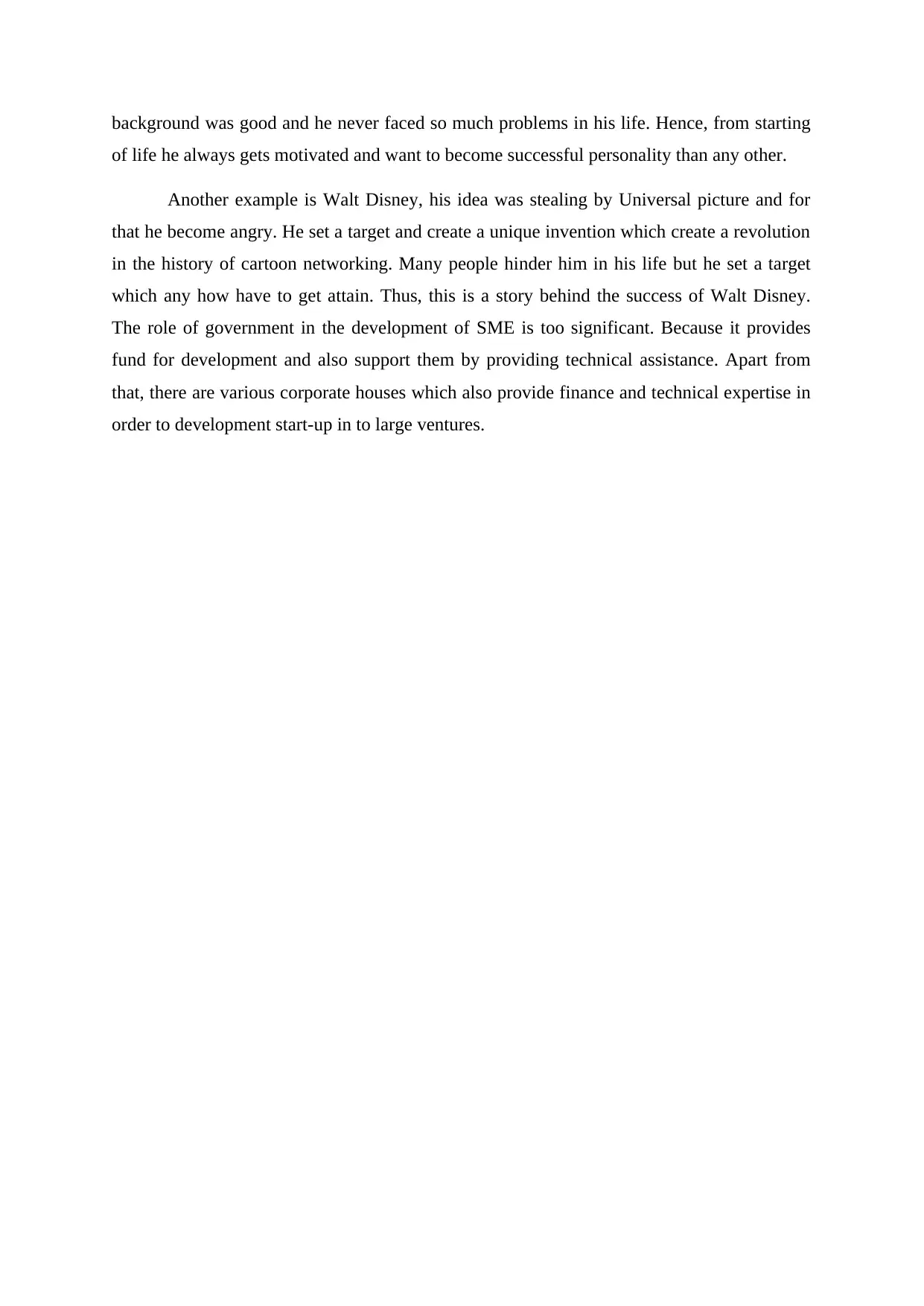
background was good and he never faced so much problems in his life. Hence, from starting
of life he always gets motivated and want to become successful personality than any other.
Another example is Walt Disney, his idea was stealing by Universal picture and for
that he become angry. He set a target and create a unique invention which create a revolution
in the history of cartoon networking. Many people hinder him in his life but he set a target
which any how have to get attain. Thus, this is a story behind the success of Walt Disney.
The role of government in the development of SME is too significant. Because it provides
fund for development and also support them by providing technical assistance. Apart from
that, there are various corporate houses which also provide finance and technical expertise in
order to development start-up in to large ventures.
of life he always gets motivated and want to become successful personality than any other.
Another example is Walt Disney, his idea was stealing by Universal picture and for
that he become angry. He set a target and create a unique invention which create a revolution
in the history of cartoon networking. Many people hinder him in his life but he set a target
which any how have to get attain. Thus, this is a story behind the success of Walt Disney.
The role of government in the development of SME is too significant. Because it provides
fund for development and also support them by providing technical assistance. Apart from
that, there are various corporate houses which also provide finance and technical expertise in
order to development start-up in to large ventures.
⊘ This is a preview!⊘
Do you want full access?
Subscribe today to unlock all pages.

Trusted by 1+ million students worldwide
1 out of 14
Related Documents
Your All-in-One AI-Powered Toolkit for Academic Success.
+13062052269
info@desklib.com
Available 24*7 on WhatsApp / Email
![[object Object]](/_next/static/media/star-bottom.7253800d.svg)
Unlock your academic potential
Copyright © 2020–2026 A2Z Services. All Rights Reserved. Developed and managed by ZUCOL.



